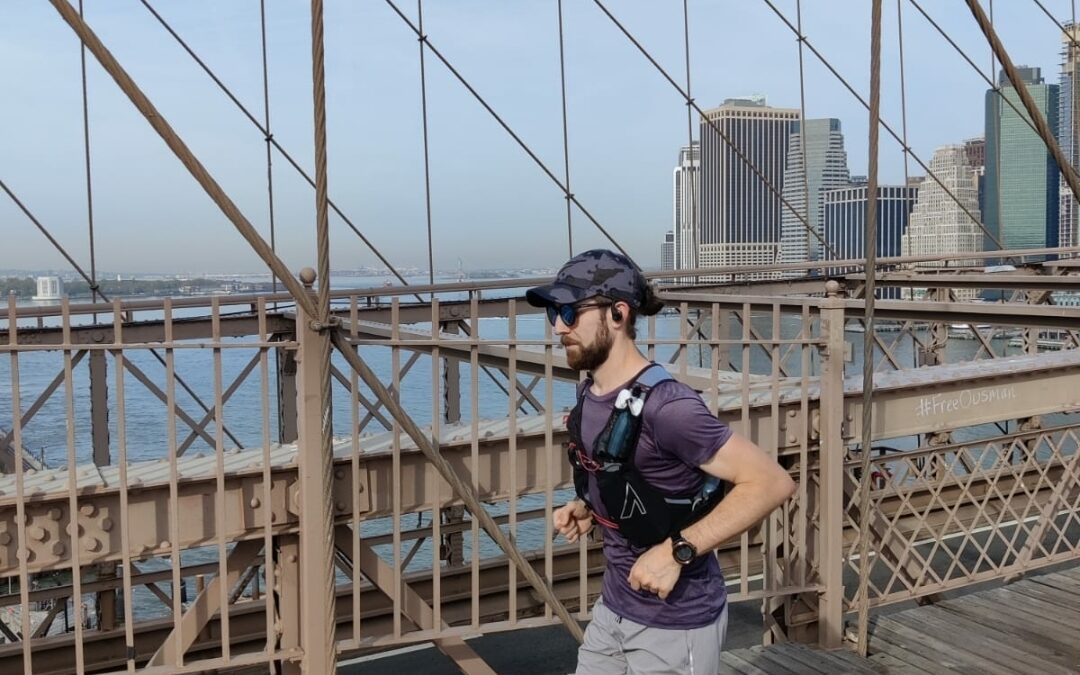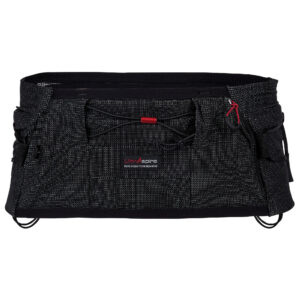written by: Anja Hayes
On March 29, 2021, Srulik Liberow was hit by a car. While running his 87th consecutive half-marathon of the year, a driver distracted by their phone swerved off of the road. The glare of the sun was blinding; Liberow could not tell that the path of the car’s side mirror was aligned to make contact. “The mirror, at 40 miles an hour hit me in my shoulder, my arm, and a part of my ribcage,” recalled Liberow. “I blacked out, but I was still standing.”
Once he regained consciousness, Liberow assessed the damage. He did not find any indication of a life threatening injury, but could tell that something was off: “I wasn’t really fully there, but I knew that my parents were only a few miles away,” Liberow described. “It was one of the days when I had forgotten to charge my cell phone.” He also knew that his parents, both emergency medical technicians, would be able to examine him further if he could manage to get to their house. So, he handed the broken mirror back to the driver and continued his run.
The same year as the accident, Liberow had undertaken a daring personal goal: to run a half marathon every day and an ultramarathon every month. The current Guinness World Record for consecutive half marathons is 133 consecutive days. Liberow, however, has surpassed over 400 consecutive days of running half marathons, a total of 5,170 miles in 2021. “It’s been, by far, the hardest thing I have ever done,” he noted. “I had to find my ‘why’ for why I wanted to do it and that part of me got tested many times over.”
Those who are personally acquainted with Liberow would not be surprised that he continued running after being struck by a car. He has been familiar with pain since day one: “I was born with Torticollis, which is essentially a broken collarbone,” Liberow revealed. The condition left a great deal of stress on his neck and back, landing him in physical therapy by the time he was three years old. Four years later, he encountered yet another issue that would come to bring an ordeal of trials. “I had gone to a roller skating rink near my house,” Liberow recounted. “An older person was roller skating and had fallen right in front of me. I didn’t want to hit them, so I fell over them.” He dodged the other skater, but at the cost of his tailbone. “I landed on it and cracked it into a bunch of pieces.”
Treatment for his shattered tailbone only encompassed a small portion of what he endured as a child. The same year, he started to teach himself English. Growing up in a Hasidic community and school, he primarily spoke Yiddish among his friends and family. By studying his parents’ EMT handbooks, he began to comprehend English and grew into an avid reader. In regards to grasping the foreign language, he remembered, “One day, looking at my mother’s car and telling her that she was almost out of gas.” His mother was astounded: she had not realized her seven-year-old had become his own teacher.
By the time Liberow was 16, he was fully fluent in his second language and an active basketball player at his community park. He also had a roster of injuries that included a dozen casts, nearly twenty broken fingers and toes, torn ligaments in two knees, and countless ankle fractures. A doctor had determined one of the root causes of these ailments to be a combination of psoriatic arthritis, which ran in his family, and other injury-related conditions. The same year, Liberow suffered spinal damage that left him with four herniated disks. He recalled how “it felt like somebody had put a stick made out of fire in my body. I would wake up in the middle of the night throwing up from the pain.” After the injury, multiple doctors informed Liberow that if he continued strenuous physical activity, he would risk becoming paralyzed. The hobbies Liberow cherished were threatened. At 16, he was faced with sacrificing either the happiness he gained from personal fitness or the ability to move.
At first, Liberow chose to preserve his mobility and forgo working out. The pickup basketball games he played at his local park became a distant memory. He was no longer fueled by adrenaline from being active, but pessimism driven by years of countless roadblocks. “In the moment, I felt like I was at the top of the hill, but was only going down.” After a while, he grew “sick and tired of being sick and tired.” Liberow managed to wean himself off of the mind-fogging pain-killers prescribed for his injuries and challenged his dismal perspective of being continually set back. He immersed himself in health and fitness literature and started waking up at 4 am every morning to study and work on his mobility. By the time he was 18, he aspired to be a fitness trainer and adopted a lifestyle of health and wellness that fit his conditions.
Liberow fully understands the risk he takes with running. When doctors advised him of the threat he faced, he came to the conclusion that the joy gained from fitness was worth the misery. “I knew that if I kept listening to doctors telling me what I can’t do, then I’m not gonna do anything,” he said. “I was basically just wasting away.” Recently, he has begun collaborating with experts in physical therapy and physiology, figuring out new ways to combat pain and up his distance. He has also taken personal initiative, continuing to study health and wellness and even becoming a certified trainer in functional range conditioning, a certification that focuses on joint health. “I became relentless in my pursuit of forward progress,” he confessed. “I wouldn’t be where I am today without those medical professionals’ help.”
Liberow also credits the support of other runners helping him along the way. He believes that “without surrounding myself with amazing athletes, in person and on social media, my whole life leading up to this moment could have been different without people believing in me.” Witnessing the personal strife of fellow runners has given him the means of continuing even when he lacked motivation. Ever since joining the UltrAspire Athlete Team in 2021, he has only gained even more confidence to push forward. He revealed that he “loved the energy and the family-vibe,” of the team. “The ‘Inspired by Athletes’ tag-line keeps me going.” One of his main goals for 2022 is to mirror the love and encouragement given to him by the ultra-running community. He wants to be a source of motivation for his team, helping runners with pacing and personal empowerment as much as possible.
“One thing I noticed [about running] is that you don’t really have to start with motivation,” he revealed. “You have to start with inspiration. And with enough work, that inspiration will turn into internal drive.” For now, Liberow continues to chase goals that are even more difficult than those in his past. He lives by the mantra that “If you want something that you’ve never had, then you are going to have to do something you’ve never done.”




